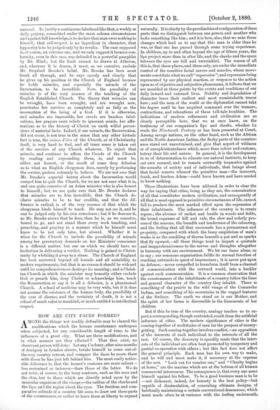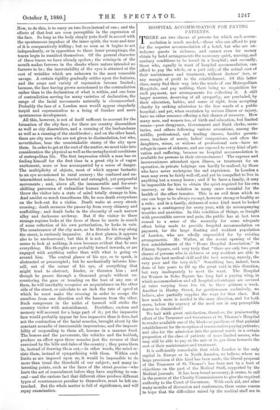HOW ARE CITY FACES FORMED ?
AMONG the things not readily definable may be classed the modifications which the human countenance undergoes -when subjected, for any considerable length of time, to the influences of a great city. What are these modifications, and in what manner are they effected ? That they exist, no observant person will deny. Let any Cockney, after nine months of drudgery in London streets, betake himself to some out-of- the-way country retreat, and compare the faces he meets there with those he has just left behind him. The most easily notice- able difference is, that the former's contours are more salient— less restrained or indrawn—than those of the latter. We do not refer, of course, to the bony contours, such as the nose and the chin, but to those which are directly acted upon by the muscular organism of the visage,—the outline of the cheeks and the lips, and the region about the eyes. The freedom and com- parative solitude of a country life seem to draw out these parts of the countenance, or rather to leave them at liberty to expand naturally. It is chiefly by the peculiarities of configuration of these parts that we distinguish between one person and another who looks something like him ; and it is here, also, that we note those changes which lead us to say that this man is older than he was, or that one has passed through some trying experience. In children, up to and often beyond the age of fifteen years, the lips project more than in after life, and the cheeks and the space between the eyes are full and unwrinkled. The reason of all this is, that these places, and these only, are under the immediate control of the sensitive facial nerves and muscles, whose move- ments constitute what we call " expression "; and expression being represented by our physical reaction, or response to the action upon us of objective and subjective phenomena, it follows that we are moulded at these points by the events and conditions of our daily inward and outward lives. Nobility and degradation of character leave their earliest and most unmistakable traces here ; and the man of the world or the diplomatist cannot take his degree until he has acquired command over the tremors, contractions, and relaxations of these tell-tale localities. The indications of modern refinement and civilisation are so clearly perceptible here, that we at once know, on the testimony of our companion's lips and cheeks, whether he reads the Nineteenth Century or has been presented at Court. Among savage nations, on the other hand, such as the African and the North-American Indian, the fleshy parts of the counten- ance stand out unrestrained, and give that aspect of wildness or of unsophisticatedness which, more than colour and customs, betray their life and nature. In general, it is the development in us of determination to educate our natural instincts, to keep our own counsel, and to remain outwardly impassive against the assaults of society and of individuals, that brings about that facial reserve whereof the primitive man—the innocent, frank, and fearless Adam—could have known and have needed to know nothing:
These illustrations have been adduced in order to clear the way for saying that cities, being as they are, the concentration of all that constitutes modern civilisation, and consequently of allthat is most opposed to primitive circumstances of life, cannot fail to produce the most marked effect upon the expression of their inhabitants. The influence of the country is to create repose ; the absence of racket and bustle in woods and fields, the broad expanses of hill and vale, the slow and orderly pro- cess of the seasons, the breadth and tenderness of the colouring, and the feeling that all that surrounds has a permanence and propriety, compared with which the fussy empiricism of man's works is as the crackling of thorns beneath a pot and as sparks that fly npward,—all these things tend to impart a quietude and inapprehensiveness to the nerves and thoughts altogether in harmony with our environment. We let our faces alone, so to say; our sensuous organisation fulfils its normal function of reaching outwards in quest of impressions ; it is never put upon its defence,—never compelled to transform itself from a channel of communication with the outward world, into a buckler against such communication. It is a common observation that the countenances of the inhabitants of a country follow the lines and general character of the country they inhabit. There is something of the prairie in the wild visage of the Comanche Indian, and something of his mountains in the rugged features of the Switzer. The earth we stand on is our Mother, and the spirit of her forms is discernible in the lineaments of her children.
But if this be true of the country, analogy teaches us to ex- pect a corresponding, though contrasted, result from the artificial influence of cities. The modern significance of cities is the coming-together of multitudes of men for the purpose of money- getting. Such coming-together involves conflict,—an opposition of the interests of each individual to the interests of all the rest. Of course, the discovery is speedily made that the inter- ests of the individual are often best promoted by temporary and partial co-operation with others ; but this fact does not affect the general principle. Each man has his own way to make, and he will and must make it, if necessary at the expense of the rest. "Look out for number one," and "Charity begins at home," are the maxims which are at the bottom of all human commercial intercourse. The consequence is, that every one arms himself against his fellow. To be a good business man is to be —not dishonest, indeed, for honesty is the best policy—but capable of dissimulation, of concealing ultimate designs, of habitually maintaining a certain conventional demeanour, which mtist needs often be at variance with the feeling underneath. Now, to do this, is to carry on two lives instead of one ; and the effects of that feat are soon perceptible in the expression of the face. So long as the body simply puts itself in accord with the spontaneous impulses of the inner spirit, the wear-and-tear of it is comparatively trifling ; but as soon as it begins to act independently, or in opposition to those inner prompting% the traces begin to manifest themselves. Of the general character of these traces we have already spoken ; the reining-in of the mouth makes furrows in the cheeks where nature intended no furrows to be ; the inscrutability of the eyes is attained at the cost of wrinkles which are unknown to the most venerable savage. A certain rigidity gradually settles upon the features, and the scope and variety of expression become limited ; because, the face having grown accustomed to the contradiction rather than to the declaration of what is within, and one form of contradiction serving for many varieties of declaration, the range of the facial movements naturally is circumscribed. Probably the face of a London man would appear singularly torpid and expressionless to a being of franker and more spontaneous development.
All this, however, is not of itself sufficent to account for the formation of the city face ; for there are country dissemblers as well as city dissemblers, and a cunning of the husbandman as well as a cunning of the stockbroker ; and on the other hand, there are city men who are not given to dissimulation, but who, nevertheless, bear the unmistakable stamp of the city upon them. In order to get at the root of the matter, we must take into consideration the physical as well as the metaphysical conditions of metropolitan life. The first impression which a man has on finding himself for the first time in a great city is of vague excitement, more or less accompanied by a sense of danger. The multiplicity of objects, most of which appear fantastic to an eye accustomed to rural scenery ; the confused and un- intermittent noises ; the hurried and entangled, yet purposeful movements ; and, above all, the innumerable and for-ever- shifting panorama of unfamiliar human faces,—combine to throw the visitor into a state of mind totally strange to him. And amidst so much tumultuous life, he sees death everywhere on the look-out for a victim. Death waits at every street- crossing; death menaces the passer-by from every chimney and scaffolding ; and death lurks in the obscurity of each narrow alley and darksome archway. But if the visitor to these strange regions looks at the faces of those he meets in search of some reflection of his own perturbation, he looks in vain. The countenance of the city man, as he threads his way along the street, is curiously impassive. At a first glance, it appears also to be unobservant; but this it is not. For although he seems to look at nothing, it soon becomes evident that he sees everything. His thoughts are probably turned inwards, or are engaged with anything rather than with what is going on around him. The central glance of his eye, so to speak, is abstracted or preoccupied ; but he mechanically informs him- self, out of the corner of his eye, of everything that might tend to obstruct, hinder, or threaten him ; and though he passes through a thousand people without en- countering the gaze or treading on the toes of any one of them, he will inevitably recognise an acquaintance on the other side of the street, or calculate to an inch the rate of speed at which he must make the crossing in order to escape the omnibus from one direction and the hansom from the other. Such composure in the midst of turmoil will strike the country visitor with astonishment. Doubtless, custom and memory will account for a large part of it ; yet the impassive face would probably appear far less impassive than it does, had not the contraction of the facial muscles, brought about by the constant assaults of innumerable impressions, and the impossi- bility of responding to them all, become in a manner fixed. The houses and the pavements, the vehicles and the hubbub, produce an effect upon these muscles just the reverse of that exercised by the hills and dales of the country ; they press them in, instead of drawing them out,—in other words, the mind re- sists them, instead of sympathising with them. Within such limits as are imposed upon us, it would be impossible to do more than tread the threshold of our subject; and many in- teresting points, such as the faces of the street gamins—who learn the art of concealment before they have anything to con- ceal—and the curious fact that different cities produce different types of countenances peculiar to themselves, must be left un- touched. But the whole matter is full of significance, and will repay examination.



































 Previous page
Previous page